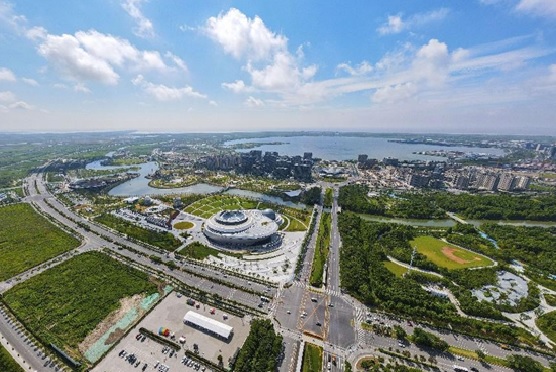By Xie Weiqun, People’s Daily
The Lingang new area of the China (Shanghai) Pilot Free Trade Zone celebrated its third anniversary recently.
“I’ve done many things here that I have always wanted to do.” That’s a common comment made by many entrepreneurs in the Lingang new area.
The Lingang new area, spurring technological innovation by promoting innovation in its institutional building, is building itself into a modern area and a special economic function zone with enormous influence and competitiveness in the international market.
So far, 90 percent of the 78 missions assigned by the State Council in a framework development plan for the Lingang newarea three years ago have been completed. The central government of China, Shanghai’s municipal government, and the Lingang new area have launched over 260 policies, which helped generate 87 cases of institutional innovation, of which 36 were attempted for the first time in China.
SPS is a new material company based in the Lingang newarea. It is one of the few Chinese producers of a type of alumina fiber that is able to extend as long as 4,000 meters and work in an environment with a temperature of over 1,500 degrees Celsius. The metal fiber is widely used in aerospace, semiconductor, automobile and other high-end manufacturing industries.
“We became able to produce the fiber less than two years after we moved to the Lingang newarea. This October, we put into use an 80,000-square-meter new plant in the area, which is expected to further expand our capacity,” said Guan Ketian, senior vice president and chief technical officer of the company.
The Yangshan Special Comprehensive Bonded Zone of the Lingang newarea is currently the sole special comprehensive bonded zone in China. To advance high-standard trade liberalization and facilitation, the bonded zone has systematically upgraded the procedures of customs supervision.
“Cargoes had to be declared at the Yangshan Port before entering the Yangshan Special Comprehensive Bonded Zone. Thanks to new supervision models, cargoes are permitted to enter the bonded zone without any declaration. This has benefited relevant enterprises, especially those that seek raw materials and customers outside China,” said Wan Jun, an official with Shanghai Customs.
According to Wan, the number of batches of cargo permitted to enter the Yangshan Special Comprehensive Bonded Zone increased six-fold in the first half of this year, compared with a year ago.
The Lingang newarea strives to build four core industries: integrated circuits, biomedicine, artificial intelligence, and civil aviation. Besides, it is also working to build competitive high-end equipment manufacturing and new energy vehicle industries and promote hydrogen energy and green development sectors for future development. The new area has established frontier industrial clusters that own core technologies.
Over the past three years, more than 300 projects of frontier technologies were inked in the special area, with a total investment of over 420 billion yuan ($58.14 billion). Such progress couldn’t have been made without the institutional innovation made by the Lingang new area.
Tax preference is a common feature of major free trade zones and ports around the world. Taking as a benchmark the world’s most advanced taxation policies implemented at other free trade ports, relevant departments of Shanghai have comprehensively studied the tax systems of Hong Kong, Singapore, Rotterdam, Dubai and other special economic function zones. They also visited over 200 enterprises in the Lin-gang Special Area to solicit opinions. Finally, a framework of tax reform measures was made, and a series of relevant policies were later announced by the State Taxation Administration.
Tax policies are one of the major reasons for SenseTime, a Hong Kong-headquartered artificial intelligence company, to place its supercomputing center and intelligent vehicle business in the Lingang new area.
“The reduced corporate income tax rate of 15 percent in the area will have a positive impact on the future development of our company. The rate of individual income tax, which also stands at 16 percent, is an attraction for talents,” said Qian Qianying, executive director of finance of SenseTime.
Tax policies are an important engine driving the rapid and high-quality development of the Lingang new area. Over the past three years, 63,000 enterprises have been registered in the special area, or 90 per day on average.
Besides, financial supervision departments have also made innovations in institutional building to facilitate enterprises, including piloting the foreign exchange management reform for cross-border trade and investment and the facilitation of cross-border settlement, investment and financing.













